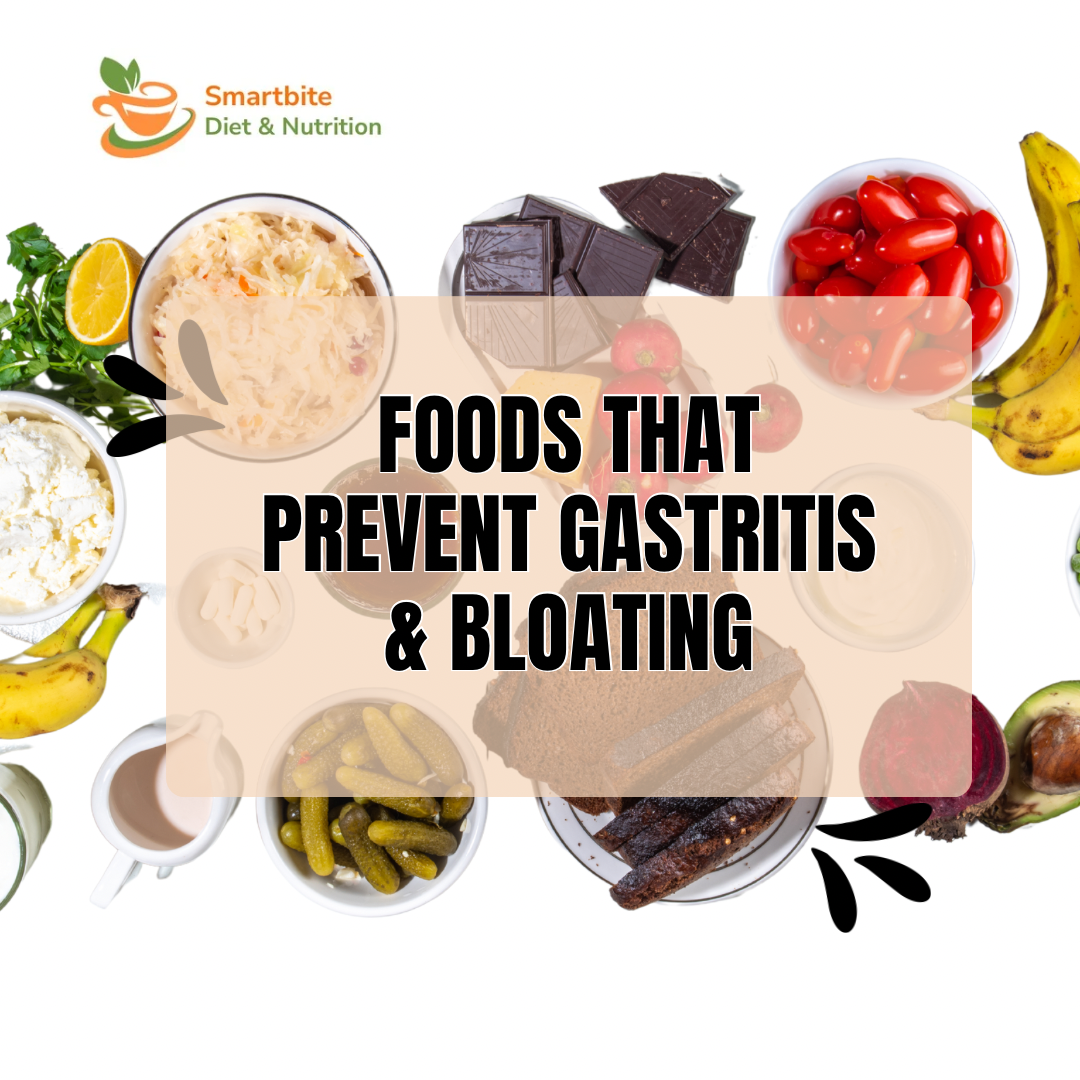Introduction:
If you experienced gastritis and bloating, you know that both are two common digestive disorders that can lead to discomfort and inconvenience in everyday life. Gastritis is inflammation of the stomach lining, while bloating — as anyone who has ever “bloated up” after a feast knows — is excessive gas or air in the stomach. Those conditions can cause pain, indigestion, nausea and a sense of fullness. Although medications can help manage these conditions, a correct diet is crucial to preventing and alleviating symptoms. In this blog, we will discuss some of the best foods which can naturally reduce gastritis and bloating, with which all Indians can relate, as they are easily available ingredients. These foods will help calm your gut and promote healthy digestion.
1. Ginger: A Natural Soother for the Stomach
Ginger has been a part of Indian medicine for centuries owing to its potent anti-inflammatory
effect. It helps relax the digestive muscles, calm nausea and relieve bloating. Ginger may help
stimulate bile production to digest fats.
How Ginger Helps:
- Soothes the lining of your stomach.
- Aids in nausea and vomiting due to indigestion.
- Helps ease bloating by stimulating digestive tract function and the expulsion of gas.
Ways to Use Ginger:
- Ginger Tea: Boil a few slices of fresh ginger in water for a comforting tea.
- In Your Meals: Sprinkle grated ginger into curries, soups or smoothies for flavor and health benefits.
2. Bananas: Easy on the Stomach
Bananas are easy to digest and are recommended for people who have gastritis or feel bloated. They’re high in pectin, a type of soluble fiber that aids in the absorption of liquid in the intestines and normalizes bowel movements. Potassium helps balance electrolytes and fight bloating, and bananas have plenty of it, too.
How Bananas Help
- Soothes stomach lining by providing a natural coating.
- Promotes healthy digestion by reducing acidity.
- Reduces bloating by normalizing fluid balance in the body.
Ways to Include Bananas:
- Eat them raw as a quick snack.
- Blend into smoothies with a bit of yogurt and honey for a delicious treat.
3 Peppermint: The Greatest Digestive Helper
It is well-known that peppermint can heal digestive problems. It helps relax muscles of the digestive tract, reducing bloating and gas. Peppermint tea may be especially effective because it acts quickly against indigestion and discomfort.
How Peppermint Helps
- Relieves bloating by allowing gas to pass more easily through the digestive system.
- Soothes the stomach lining and reduces acid production.
- Improves digestion by relaxing the gastrointestinal muscles.
Ways to Use Peppermint
- Peppermint Tea: Brew peppermint leaves in hot water to make tea.
- Chew Peppermint Leaves: Fresh peppermint leaves can also be chewed after meals to aid digestion.
4. Oats: A Gentle Fiber -Rich Option
Oats are high in soluble fiber, which regulates digestion and alleviates bloating. The fiber of oats creates a sort of gel in the stomach that can help to facilitate the movement of food and gas. Oats are also great at calming an upset stomach , lining, therefore ideal for gastritis golfers.
How Oats Help:
- Relieves constipation by improving bowel movements and preventing bloating.
- Soothes inflammation in the stomach lining due to their high fiber content.
- Promotes gut health by encouraging healthy digestion.
Ways to Include Oats:
- Oatmeal: Have a warm bowl of oatmeal in the morning with nuts or fruits.
- Oats Smoothie: Blend oats with your favorite fruits and yogurt for a nutritious smoothie.
5. Yogurt: A Probiotic Powerhouse
A good source of probiotics, yogurt is a natural way to promote gut health. Probiotics balance the gut microbiome, reduce inflammation and ease digestion, which can help prevent bloating and gastritis. The good bacteria in yogurt helps food move more easily through the digestive tract and helps decrease gas formation
How Yogurt Helps:
- Reduces inflammation in the stomach lining.
- Improves digestion by promoting the growth of healthy gut bacteria.
- Relieves bloating and gas by balancing the gut flora.
Ways to Include Yogurt:
- As a Snack: Eat a bowl of plain yogurt with a drizzle of honey or fruit.
- Yogurt Parfait: Layer yogurt with oats, fruits, and nuts for a satisfying snack.
6. Aloe Vera: A Natural Healer for the Stomach
Everyone knows aloe vera is a medicinal plant. It also has anti-inflammatory compounds that may calm the stomach lining and lessen acidity. Aloe Vera is also Excellent for digestion, keeps
bloating away & soothes intestines for normal flow.
How Aloe Vera Helps:
- Soothes the stomach lining and reduces acidity.
- Reduces bloating by improving digestion.
- Acts as a natural laxative, promoting regular bowel movements.
Ways to Use Aloe Vera:
- Aloe Vera Juice: Drink aloe vera juice (ensure it’s pure and without added sugar) for relief from gastritis and bloating.
- Aloe Vera Gel: You can also consume a small amount of aloe vera gel mixed with water or in smoothies.
7. Fennel Seeds: A Bloating Reliever
In Indian households, fennel is a popular household remedy for indigestion and bloating. They assist in the release of excess gas from the stomach and intestines. Also, fennel seeds
stimulate the production of digestive enzymes, facilitating digestion and relieving constipation.
How Fennel Seeds Help:
- Relieves bloating by reducing the buildup of gas.
- Promotes digestion by enhancing enzyme activity in the gut.
- Relieves heartburn and indigestion by soothing the stomach lining.
Ways to Use Fennel Seeds:
- Chew Fennel Seeds: After meals, chew on a teaspoon of fennel seeds to help with digestion.
- Fennel Tea: Brew fennel seeds in hot water for a soothing tea.
8. Papaya: A Digestive Enzyme Booster
Another great fruit for people with gastritis or bloating is papaya. It has an enzyme known as papain that helps digest proteins and facilitates digestion. Papaya works on the inflamed
stomach lining and also relieves constipation.
How Papaya Helps:
- Reduces inflammation in the stomach lining and promotes healing.
- Boosts digestion with its natural digestive enzymes.
- Relieves bloating by improving gut motility.
Ways to Include Papaya:
- Eat Fresh Papaya: Enjoy a slice of papaya as a light and refreshing snack.
- Papaya Smoothie: Blend papaya with yogurt or coconut water for a soothing smoothie.
9. Carrots: A Stomach-Friendly Vegetable
Carrots are rich in antioxidants and fiber, promoting gut health. They aid in decreasing inflammation in the digestive tract, support regular bowel movements, and relieve bloating.
How Carrots Help:
- Soothes the stomach lining and reduces inflammation.
- Promotes digestion with its high fiber content.
- Helps prevent constipation and bloating.
Ways to Include Carrots:
- Raw Carrots: Snack on raw carrot sticks or add them to salads.
- Carrot Soup: Make a soothing carrot soup with minimal spices for an easy-to-digest meal.
10. Coconut Water: A Natural Hydrator
Coconut water is known for its hydrating properties and is often recommended for digestive issues. It helps in balancing electrolytes, reduces acidity, and prevents dehydration, which is
often a contributing factor to bloating.
How Coconut Water Helps:
- Hydrates the body and reduces bloating caused by dehydration.
- Soothes acidity and helps balance stomach acid levels.
- Improves digestion by promoting regular bowel movements.
Ways to Include Coconut Water:
- Drink Fresh Coconut Water: Enjoy a glass of fresh coconut water on an empty stomach for relief.
- Coconut Water Smoothie: Blend coconut water with fruits like pineapple for a refreshing, digestive-friendly drink.
Conclusion:
Gastritis and bloating are incredibly uncomfortable, and eating the right foods is one of the best
ways you can manage and even prevent these conditions. Adding ginger, bananas,
peppermint, oats, yogurt and fennel seeds to your diet can work wonders to help improve digestion, decrease inflammation and improve gut health. Also, never forget to hydrate, not get
too full and have mindful eating to avoid bloating and gastritis.
If you are struggling with ongoing symptoms, always speak with a healthcare provider for a
more individualised plan for your diet and treatment.






